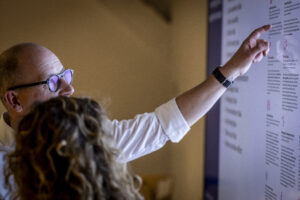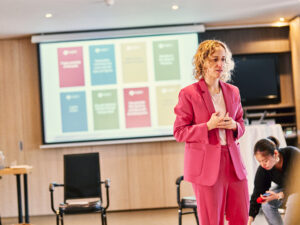In the realm of organizational leadership and decision-making, a critical conversation is brewing about the dominance of ‘masculine’ ethics, characterized by universal principles, rationality, and a focus on outcomes. But is it time we consider the equally important ‘feminine’ ethics, which emphasizes the particular, relational, and care-oriented approaches? This discussion arises from an insightful roundtable that brought together experts from diverse fields to explore the balance between these two perspectives.
The transformation of corporate rigidity to personal development
Joris De Kelver, co-founder of Multiversity, shares his transition from a two-decade career in a structured corporate environment to exploring personal development and life arts. His journey underscores a shift from the traditional masculine focus on efficiency and outcomes to a more balanced approach that also values personal growth and emotional intelligence. This shift was partly motivated by personal losses and a reevaluation of what truly constitutes meaningful work and personal fulfillment.
Intuitive leadership and the importance of care in family and work environments
Axelle*, People & Culture manager at a prominent family-owned business, emphasizes the importance of intuition and care in leadership roles. Drawing parallels between family management and organizational leadership, she highlights how skills like effective feedback, commonly applied in business settings, are vital within families too. Her approach champions a nurturing style, reflecting the ‘feminine’ ethics of care, which fosters open communication and mutual understanding.
The academic perspective on leadership: bridging theory and practice
Karen Wouters and Kathleen Vangronsvelt discuss the integration of academic knowledge with practical application in leadership roles. Wouters, who has a rich background in teaching and practical experience, advocates for a blend of academic rigor and real-life application in leadership development. Vangronsvelt’s experience in organizational behavior emphasizes the need to bridge the often wide gap between theoretical knowledge and its practical applications, particularly in understanding and implementing gender equity in leadership roles.
The shift from masculine dominance to a more inclusive ethical framework
The narrative also explores the broader implications of a masculine-dominant ethical framework in organizations, which often leads to rigid, consequentialist approaches focusing on the greatest good for the greatest number. The conversation advocates for incorporating feminine ethics, which prioritize relational and particularistic concerns that might better address individual and community-specific needs.
Challenging the status quo in organizational design and leadership
The roundtable discussion critically examines the traditional organizational designs that predominantly reflect masculine ethics, questioning their suitability in today’s diverse and dynamic environment. Participants discuss the potential for organizations to evolve by embracing more feminine ethics, which could lead to more holistic and sustainable practices.
The role of personal loss and emotional insights in ethical leadership
Joris’s personal experiences with loss and the emotional insights gained play a crucial role in his ethical transformation. These experiences highlight the importance of empathy, relationships, and a supportive environment in fostering ethical leadership, underscoring the need to balance masculine and feminine ethics in both personal and professional realms.
Collective and individual transformation: a path towards sustainable impact
The dialogue concludes with a focus on the potential for both individual and collective transformation in organizations. By embracing a more balanced approach to ethics that includes both masculine and feminine perspectives, organizations can foster environments that promote sustainable impact, deeper employee engagement, and more innovative problem-solving strategies.
This discussion at the roundtable represents a microcosm of a larger movement towards rethinking and reshaping the ethical frameworks within which we operate, both in our personal lives and in organizational contexts. By valuing and integrating both masculine and feminine ethics, we pave the way for more balanced, fair, and caring decision-making practices that can profoundly impact our societies and workplaces.
The roundtable discussions and revelations promote a reconsideration of existing leadership and decision-making paradigms. By acknowledging our mortality and recognizing the limitations of traditional approaches, we become receptive to new paradigms that better encompass the intricacies and diversities of the human experience.
* wished to participate anonymously in the round table





